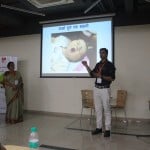The biggest human temptation is to settle for too little.
~ Thomas Merton
It’s hard to improve when everyone keeps telling you how great you already are. Walk around with a disability and everyone finds you amazing. Have a child with special needs and you are promoted to sainthood. Tell someone you work in the field and all standards disappear.
Disabled? Whatever you do is way, way more than anything I thought you capable of. (You’re buying your own milk? You’re so inspiring!)
Parent of a disabled child? God only chooses the best to care for his special angels. (What an incredible mother you are. I could never do what you do!).
Working in the field? Whatever you do, however you do it, is so much more than anyone should have to do. (You must be so noble! You must have so much patience!)
So why would you want to improve as a person, as a parent, as a professional? Why would you bother to grow or develop if the only message you ever get is that you are already astonishing, already way better than necessary, already beyond anyone’s wildest dreams?
We aren’t even expected to maintain standards – let alone push ourselves to achieve greater heights of excellence.
What happens to a child from whom nothing is expected? What kind of parents think they’ve already arrived at perfection? What sort of institutions are created when the standards which apply to every other profession are relaxed for them?
 It’s up to us, therefore, to police ourselves. Whether we are persons with disability, parents or professionals, we can’t rely on the external supports that work in the rest of the world. The speed limits that keep us safe on the highways, the honour rolls that encourage us to do our best and achieve our potential, the community pressure that compels us to provide our children with the best environment we can afford – they aren’t there for us or for our work.
It’s up to us, therefore, to police ourselves. Whether we are persons with disability, parents or professionals, we can’t rely on the external supports that work in the rest of the world. The speed limits that keep us safe on the highways, the honour rolls that encourage us to do our best and achieve our potential, the community pressure that compels us to provide our children with the best environment we can afford – they aren’t there for us or for our work.
We have to set our own standards, monitor our own performance and establish new goals whenever the last ones are achieved. We have to stay alert and ever watchful. Constant Vigilance!
It’s nice to hear how wonderful, inspiring and amazing you are. It’s lovely to be told you are perfect and that there is nothing to improve upon. But we all know it is neither helpful nor true. This year, the clarion call at the Latika Roy Foundation is the seemingly uninspiring: “Not good enough.”
It’s not good enough for the kids to just be happy: are they also learning and achieving as much as they possibly can? It’s not good enough for the families to just be grateful: are they also empowered and confident enough to question our ideas and come up with their own? It’s not good enough for the team to just be devoted and loving: are they also passionate about their professions and committed to learning and doing more?
Complacency is insidious because by its very nature we don’t recognise it when we are most steeped in it. The older we get, the more dangerous it becomes. The Latika Roy Foundation is 22 now and we get our share of praise and adulation. These days, we try to ignore it.
Constant vigilance! We’re focused on excellence; we’re paying attention to every detail and we are reviewing our results all the time. Our goal is nothing less than perfection. It may not be possible, but don’t tell us that.


